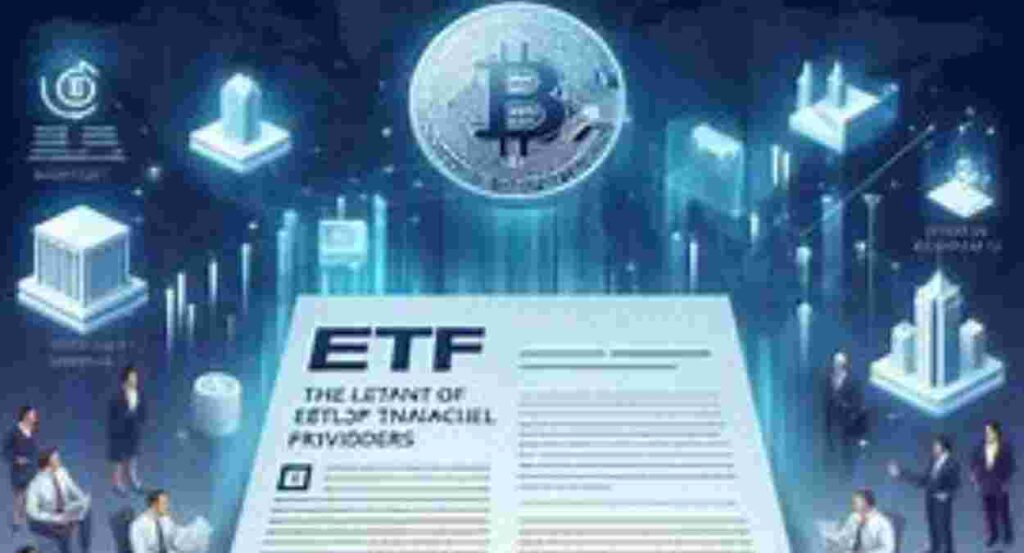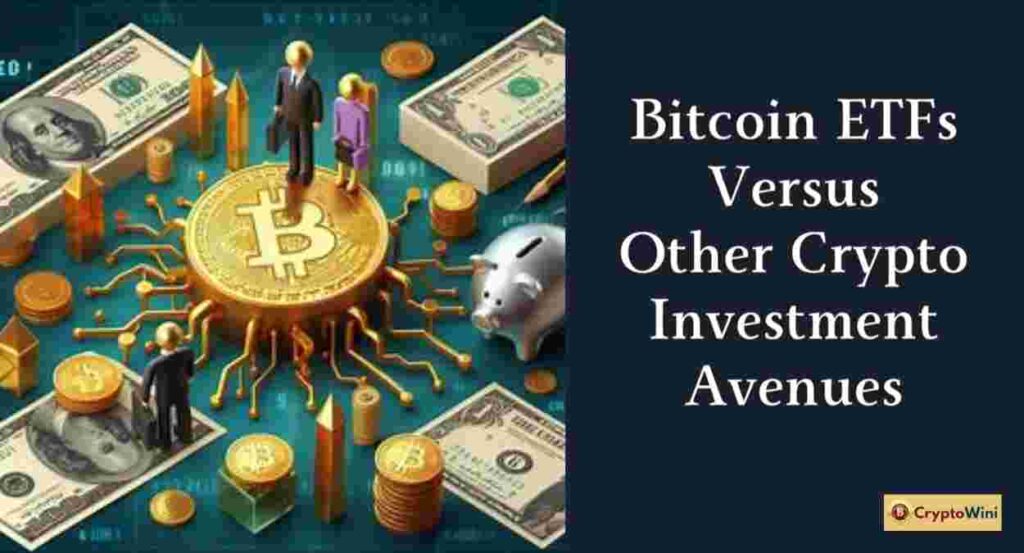{ Bitcoin ETF, SEC approved Bitcoin ETF, Investing in Bitcoin ETF, Bitcoin ETF launch, Bitcoin ETF investment, Trade Bitcoin ETF, Bitcoin ETF trading, Benefits of Bitcoin ETF, Risks of Bitcoin ETF, Bitcoin ETF fees, Bitcoin ETF vs buying Bitcoin, Invest in US Bitcoin ETF from India }

The Arrival of Bitcoin ETFs: A New Era of Crypto Investing for Retail Traders
The long-awaited moment has finally arrived – Bitcoin exchange-traded funds (ETFs) are live in the US! The Securities and Exchange Commission (SEC) approved several spot Bitcoin ETFs in January 2024, marking a major milestone for the crypto industry. This development opens the floodgates for millions of retail investors to gain exposure to Bitcoin in their brokerage accounts without directly handling the asset.
But what exactly are Bitcoin ETFs, how do they work, and what benefits do they offer compared to other ways of investing in crypto? Let’s explore the game-changing implications of Bitcoin ETFs for retail traders.
Please also read the article based on the recent clarification by SEC :
SEC Confirms Hack of Twitter Account and Fake Bitcoin ETF Approval
What is a Bitcoin ETF?
A Bitcoin ETF is an exchange-traded fund that tracks the price of Bitcoin. It allows investors to gain price exposure to Bitcoin without having to buy, store, and safe keep the digital asset directly.
ETFs are securities that track an underlying basket of assets. They can be bought and sold on exchanges just like stocks. A Bitcoin ETF simply tracks the price of Bitcoin based on its spot price on crypto exchanges.
The ETF provider purchases and holds Bitcoins on behalf of investors. The Bitcoins are stored with a regulated crypto custodian for security. The ETF shares represent a claim on the underlying Bitcoins held by the fund.
How Do Bitcoin ETFs Work?
Bitcoin ETFs offer an easy, convenient way to invest in Bitcoin without dealing with crypto exchanges or wallets. Here’s how they work:
- The ETF provider sources Bitcoins from exchanges to back the ETF shares. The Bitcoins are held with a custodian.
- The ETF shares are listed on a stock exchange and traded like regular stocks during market hours. Their price tracks Bitcoin’s spot price.
- Investors can buy and sell ETF shares from brokers without worrying about buying/selling actual Bitcoins.
- The ETF manager handles custody and security. Investors avoid risks of hot wallets or lost private keys.
- ETF shares can be conveniently held in existing brokerage accounts like stocks. No new accounts needed.
- Investors pay fund fees but avoid exchange fees, wallet fees, and network transaction fees.
- The ETF structure makes Bitcoin investing fully compliant from a regulatory perspective.

Key Benefits of Bitcoin ETFs Over Direct Bitcoin Ownership
Here are some of the main advantages Bitcoin ETFs offer over purchasing Bitcoin directly from a crypto exchange or wallet:
- Regulated Providers: Bitcoin ETFs are offered by established, regulated financial institutions that provide validity to crypto investing for mainstream investors.
- Simple Investing Process: Buying a Bitcoin ETF is as easy as buying a share of stock through your brokerage account. Much simpler than using a crypto exchange.
- Avoid Crypto Storage Security Risks: The ETF provider handles all the custody and security of the actual Bitcoins, eliminating risks of hot wallet hacks, lost private keys, forgetting seed phrases, etc.
- Compliant Investing Avenue: No need to put money into unregulated crypto exchanges with unclear rules. Bitcoin ETFs provide a fully compliant way to invest.
- Diversify Portfolios Seamlessly: Bitcoin ETFs allow seamlessly adding crypto to traditional portfolios alongside stocks, bonds, and mutual funds without barriers to entry.
- Lower Fees: Just the fund expense ratio fee applied. Avoid exchange fees, wallet fees, and network gas fees associated with directly transacting in Bitcoin.
- High Liquidity: Bitcoin ETFs see large trading volumes, allowing easy entry and exit for investors. Bitcoin itself can sometimes have liquidity challenges.
- Passive Investing: Like index funds, Bitcoin ETFs offer passive exposure without having to actively trade and time the market. Ideal for long-term buy-and-hold.
- Proper Reporting: Bitcoin ETFs provide proper tax statements and reporting that can be problematic for direct crypto investors.
- Accessibility: Bitcoin ETFs are accessible to anyone with a standard brokerage account and basic investing knowledge. Direct Bitcoin ownership has a steep learning curve.

Top Providers Launching Bitcoin ETFs
Several high-profile providers have launched Bitcoin ETFs after years of attempts to get SEC approval. Here are some of the major players:
Grayscale Bitcoin Trust ETF (GBTC)
- One of the first Bitcoin investment trusts that is converting into an ETF
- Has amassed over $20 billion in assets under management so far
- Grayscale is a digital asset manager focused exclusively on crypto assets
- GBTC will charge a 1.5% annual fee
Valkyrie Bitcoin ETF (BRRR)
- Valkyrie is a specialized financial firm focused on crypto asset funds
- BRRR aims for close price tracking based on CME Bitcoin futures contracts
- Charges a competitive 0.25% expense ratio
- Currently has a fee waiver making it free to invest in BRRR
WisdomTree Bitcoin ETF (BTCW)
- WisdomTree is an established ETF issuer with over $81 billion assets under management globally across 500 funds
- BTCW charges 0.30% annually and tracks Bitcoin spot prices from various crypto exchanges
- WisdomTree also has a niche Ethereum ETF planned underscoring its commitment to crypto
Bitwise Bitcoin ETF (BITB)
- Bitwise is an asset manager focused exclusively on crypto index and funds
- BITB charges rock-bottom 0.20% expense ratio
- Has a temporary fee waiver currently making it free for investors
- Will track Bitcoin prices sourced from 10 regulated cryptocurrency exchanges globally
Ark 21Shares Bitcoin ETF (ARKB)
- Ark Invest is known for its disruptive tech-focused ETFs and research
- Cathie Wood, Ark’s CEO, has been outspoken about her bullish Bitcoin predictions
- ARKB has a razor-thin expense ratio of 0.21%
- Will track the price of Bitcoin using various spot exchanges

Bitcoin ETFs Trade Like Regular Stocks: Here’s How
Bitcoin ETFs trade on stock exchanges just like regular stocks during market hours. Here are some key points about trading Bitcoin ETFs:
- The ETF shares can be bought and sold seamlessly via brokerage accounts. No need to interact with crypto exchanges.
- Trading occurs during regular stock market trading hours. Bitcoin never sleeps, but the ETFs can only be traded when exchanges are open.
- The ETF share price closely tracks Bitcoin’s real-time spot price on crypto exchanges, adjusted for fees and expenses.
- Trading volumes and liquidity depend on investor demand. Popular ETFs like GBTC and BITB are expected to have high liquidity.
- Investors can place different order types like market orders, limit orders, stop orders, etc. just like stocks.
- Bitcoin ETFs can be traded using desktop platforms, mobile apps or even automated bots like other ETFs.
- Unlike owning Bitcoin itself, investors don’t need to worry about wallet security, private keys, cold storage etc.
- Taxes for Bitcoin ETFs are similar to those for stocks and ETFs rather than cryptocurrency tax rules.
Just like stock ETFs, Bitcoin ETFs enable passive investing for those looking for Bitcoin exposure without active trading. You can buy and hold for the long term based on your risk profile.
Bitcoin ETFs: Under the Hood
While trading Bitcoin ETFs is simple, a lot goes on under the hood to make them work efficiently. Here are some key aspects of how they operate:
Sourcing and Storage of Bitcoins
The fund manager sources Bitcoins from various regulated crypto exchanges to build reserves to back the ETF shares. These Bitcoins are stored securely with regulated crypto custodians that handle security.
Fund Custody
The Bitcoin reserves are held in cold storage wallets by specialized custodians like Coinbase Custody and Anchorage Digital which provide insured fund protection through syndicates like Lloyd’s of London.
Tracking Mechanism
The ETF share price tracks Bitcoin price based on an index calculated from prices across major spot exchanges like Coinbase, Kraken, Gemini and Binance weighted by volume.
Portfolio Rebalancing
When needed, the fund manager rebalances the portfolio by buying and selling Bitcoins. This keeps the ETF price closely mirroring the Bitcoin index it tracks.
Fund Management Team
Experienced fund managers oversee the ETFs portfolio based on crypto market trends. Some ETFs like Grayscale have dedicated crypto-focused managers with deep expertise.
Security Audits
Independent security auditors and processors verify and audit Bitcoin holdings and transactions regularly to ensure proper fund management and risk mitigation.
Insurance Coverage
Leading ETF providers have insurance coverage against theft and loss of the fund’s Bitcoin assets through policies from firms like Marsh and Aon.

How Indians Can Invest in US Bitcoin ETFs
Indian investors can gain exposure to these US SEC-approved Bitcoin ETFs by routing investments through the Liberalized Remittance Scheme (LRS).
- Under LRS guidelines, resident Indians can remit up to $250,000 abroad in a financial year for approved purposes like investments.
- You can open an international trading account with brokers like Vested Finance, Winvesta, Interactive Brokers etc. that allow US stock and ETF investing using LRS.
- Funds can then be seamlessly transferred from India to the US trading account via LRS and deployed into Bitcoin ETFs and other US stocks.
- This avenue avoids the 18% GST that Indian crypto exchanges levy. But the base 20% TCS tax still applies on remittances above ₹7 lakh in a fiscal.
- TCS can be used to offset your overall income tax liabilities in India. It is not an additional cost unlike GST.
- You avoid crypto transaction fees and get better tax advantage compared to using Indian crypto exchanges which levy 1% TDS.
- Investing through international brokers provides access to the SEC regulated Bitcoin ETF market in a compliant manner with no access issues.
Evaluating the Top Contenders Before Investing
With multiple ETF providers entering the fray, investors should evaluate the options before choosing a Bitcoin ETF:
Parameters
| ETF | Expense Ratio | AUM | Tracking Method | Custodian |
|---|---|---|---|---|
| GBTC | 1.5% | $24 Billion | Bitcoin futures | Coinbase |
| BITB | 0.20% | $18 Million | Global spot prices | NYDIG |
| BRRR | 0.25% | $5 Million | CME futures | Anchorage Digital |
| BTCW | 0.30% | $10 Million | Multiple spot feeds | Coinbase |
| ARKB | 0.21% | $15 Million | Spot prices | Coinbase |
Some key factors to consider:
- Fees: Lower is better. Fees eat into returns over time.
- Fund Manager: Their brand reputation and crypto experience matter.
- Tracking Method: Spot prices offer closer tracking than futures-based ETFs.
- Custodian: Reviews and quality of their custody solution.
- Liquidity: Check projected trading volumes for ease of trading.
- Assets Under Management: Large AUM provides validation.
Study various providers across these parameters before selecting a Bitcoin ETF for investing.
The Road Ahead for Bitcoin ETFs
The US SEC’s approval of Bitcoin ETFs removes a major barrier to mainstream crypto adoption. The impacts are already being seen with record sign ups on brokerages as new investors flock to the asset class.
Fidelity Investments saw a 26% increase in crypto traders in January 2024 after years of declining numbers. E*Trade also added over 400,000 new accounts in the same period.
But this is just the beginning. The real inflection point will come when regulators in other financial hubs like Singapore, Hong Kong, Dubai, and leading European economies follow suit in approving Bitcoin ETFs.
Eventually India could also join the club, granting approval for domestic Bitcoin ETFs to be launched for Indian citizens. But China with its crypto ban and resistance to financial liberalization may be a laggard.
Major institutional investors have already been warming up to crypto assets over the past 2-3 years. Bitcoin ETFs could provide the necessary push for significantly higher participation from pension funds, mutual funds and other conservative institutions.
Overall, easy Bitcoin investing access for retail and sophisticated traders across the world may turbocharge adoption and take it mainstream in this decade. Of course, risks remain elevated due to crypto’s legendary volatility. Investors enamored by the 1000% gains of early adopters need to temper expectations and brace for a wild rollercoaster ride.

Factors Impacting Bitcoin ETF Pricing
The share price of Bitcoin ETFs is impacted by several key factors:
- Spot Bitcoin Price: The biggest driver is Bitcoin’s real-time spot price across crypto exchanges, which the ETF aims to closely track after fees and expenses.
- Bitcoin Futures: ETFs tracking CME Bitcoin futures prices (e.g. BRRR) will be impacted by futures price swings and contango/backwardation.
- Demand for Shares: Investor demand for the ETF shares impacts share price and whether it trades at premium/discount to Bitcoin price.
- Supply of Shares: The fund manager can issue new ETF shares based on demand, influencing share price.
- Competition: Launch of new Bitcoin ETFs can impact relative demand between competing providers.
- Fees: Lower fees can support higher ETF share prices relative to NAV and Bitcoin spot.
- Index Composition: Spot ETFs tracking broader indexes are less impacted by issues at any single exchange.
Tax Implications of Investing in Bitcoin ETFs
Taxes on Bitcoin ETFs are similar to taxes on regular stocks and equity ETFs:
- Short-term gains: Taxed at your income tax slab if shares held <1 year before selling.
- Long-term gains: Flat 15%/20% long-term capital gains tax if held 1 year+.
- No TDS: No tax deducted at source unlike on Indian crypto exchanges which levy 1% TDS.
- TCS Applies: 20% Tax collected at source still applicable above ₹7 lakh remitted overseas via LRS annually.
- Loss Offsetting: Losses can be offset against other stock/ETF capital gains per IT filing.
- Tax Form: Gains/losses are to be disclosed in ITR 2 Schedule CG under the equity section, not Schedule OS (crypto).
- No Wealth Tax: No wealth tax for holding Bitcoin ETF units, unlike direct crypto assets which attract 1% tax above ₹1 crore.
Which Type of Investors are Bitcoin ETFs Suited For?
Bitcoin ETFs allow easy access to Bitcoin for the following investor profiles:
- Beginner Investors: New investors who want Bitcoin exposure without the complexities of crypto wallets and exchanges.
- Passive Investors: Those looking to invest and hold Bitcoin long-term without active crypto trading.
- Retirement Savers: People looking to diversify traditional retirement portfolios conservatively into crypto.
- Institutional Investors: Endowments, pensions and mutual funds are likely to prefer the regulated Bitcoin ETF route over direct access.
- Indian Investors: LRS provides Indian investors an easy off-ramp to invest in Bitcoin ETFs listed in the US and other approved jurisdictions.
- ETF Investors: Existing ETF enthusiasts who want to add a little crypto allocation along with their equity and bond ETFs.
- Tech Enthusiasts: Those bullish on blockchain wanting regulated exposure to the asset class through trusted financial brands.
- Hedge Funds: Crypto and blockchain-focused hedge funds looking for quick entries and exits with high liquidity.
Key Crypto Developments Underpinning the Bull Case
Bitcoin’s potential as digital gold underpins the bullish case for Bitcoin ETFs. However crypto infrastructure and adoption improvements also strengthen the investment thesis:
- Fidelity and other major financial players entering crypto custody and trading
- Lightning network crossing $5 billion capacity marking growing Bitcoin scalability
- Record hash rate and mining difficulty indicating strong security and infrastructure
- Major brands like Microsoft, and Starbucks accept crypto payments
- Significant venture funding for Web 3.0 and metaverse on blockchain rails
- Central bank digital currency experiments by governments worldwide
- Explosive NFT growth bringing crypto to mainstream culture
- Defi protocols crossing $100 billion in total value locked
- El Salvador making Bitcoin legal tender plus other countries showing interest
However, Bitcoin ETFs remain a speculative bet on broader crypto and blockchain adoption given Bitcoin’s limited utility currently relative to its $1 trillion valuation. Invest carefully after assessing your risk appetite.

Bitcoin ETFs Versus Other Crypto Investment Avenues
For investors new to the crypto space, Bitcoin ETFs offer a simpler starting point compared to other investment avenues like:
Bitcoin ETFs
- Regulated structure provides compliance
- Easy to buy/sell through brokerage accounts like stocks during exchange hours
- Avoid risks of managing crypto storage and keys
- Transparent pricing and reporting
- Potentially lower fees than direct ownership
- Taxed as capital assets like stocks, not as collectibles
Direct Bitcoin Ownership
- Directly interact with the asset by purchasing via exchanges
- Self-managed wallet risks and responsibilities
- Taxed under complex crypto tax rules
- Need to choose secure storage solutions
- Vulnerable to exchange hacks and loss of keys
- Higher fees like exchange charges and gas fees
- Ability to use Bitcoin for payments
Bitcoin Futures
- Allow speculating on Bitcoin prices without owning actual asset
- Complex products not suitable for novice traders
- Require margin accounts and collateral
- Associated rollover costs as expiry dates approach
- High risk of liquidations if margin cover depleted
Bitcoin Mining Stocks
- Publicly traded stocks of Bitcoin mining firms
- Indirect exposure to crypto tied to company prospects
- Prone to equity market risks and volatility
- Lack direct correlation to Bitcoin prices
- Research required to pick winning miners
Grayscale Bitcoin Trust
- Closed-end Bitcoin fund available since 2025
- Becoming an ETF in 2024 at lower 1.5% fee
- Traded at high premiums previously
- No redemption of shares for Bitcoin unlike ETF
For most retail investors, Bitcoin ETFs strike the optimal balance between accessibility, compliance, risk management and costs. But as expertise develops, direct exposure avenues can be considered.

Tracking the Emergence of Cryptocurrency ETFs
While Bitcoin ETFs grabbed the headlines in early 2024, the approval sets the stage for ETFs across other leading cryptocurrencies like Ethereum. Here is the landscape for crypto ETFs:
Bitcoin ETFs
- As of January 2024, 11 spot Bitcoin ETFs have been approved by the US SEC
- Providers include Grayscale, Valkyrie, Bitwise, Ark Invest, Fidelity and more
- Some futures-based Bitcoin ETFs already existed like the ProShares Bitcoin ETF (BITO)
Ethereum ETFs
- After Bitcoin, Ethereum is the next most mature open blockchain network with its native crypto asset Ether
- The Grayscale Ethereum Trust (ETHE) is looking to convert into an ETF
- WisdomTree has filed for an Ethereum ETF that could get approved after Bitcoin
Other Altcoin ETFs
- With over 10,000 cryptos, only a handful make the cut for ETFs due to regulatory caution
- Solana, Cardano, Polkadot and other leading altcoins could see ETFs emerge eventually
- But less mature assets further down the market cap ranking are unlikely to be approved soon
Crypto Basket ETFs
- Asset managers could offer diversified baskets tracking the wider crypto market
- This avoids risks of investing in just one asset like Bitcoin or Ethereum
- SEC is likely to be cautious of broad-based products tracking highly volatile assets
Blockchain ETFs
- These ETFs invest in stocks of firms involved in crypto and blockchain technology like miners and infrastructure providers
- Indirect plays on the crypto ecosystem rather than direct cryptocurrency assets
- AUM of blockchain ETFs has already surpassed $1 billion showcasing interest
The path is clear for more variety in crypto ETF products now that the first dam has broken. But expect regulators worldwide to adopt a calibrated approach, as more exotic products can amplify risks for amateur investors.
Watch the Web Story on Bitcoin ETFs
FAQs About Investing in Bitcoin ETFs
What are the risks of investing in a Bitcoin ETF?
As with any investment linked to crypto, Bitcoin ETFs carry risks of high volatility. Bitcoin prices can swing wildly, leading to big gains or losses. Invest only as per your risk appetite after understanding the hazards.
Can I buy Bitcoin ETFs from India?
Yes, Indian residents can invest in US Bitcoin ETFs via Liberalized Remittance Scheme by using an international brokerage account from providers like Vested Finance, Winvesta, Interactive Brokers etc.
Do I need a Demat account for Bitcoin ETFs?
No Demat account is needed. You can conveniently hold Bitcoin ETFs in international brokerage accounts that allow US stock investments using LRS.
Is a Bitcoin ETF safer than buying Bitcoin itself?
Bitcoin ETFs reduce risks related to hot wallet hacks, lost private keys, seed phrase issues, crypto storage complexity etc. by having regulated providers handle custody and security.
How are Bitcoin ETF fees compared to index funds?
Bitcoin ETF expense ratios currently range from 0.20% to 1.5%. This is lower than other crypto funds but higher than mainstream index ETFs which often charge below 0.10% annually.
Can I trade Bitcoin ETFs anytime like crypto exchanges?
No, Bitcoin ETFs can only be traded during exchange trading hours unlike 24×7 crypto exchanges. Liquidity gets confined to regular market trading hours.
Which Bitcoin ETF should I choose?
Evaluate aspects like fees, fund manager brand and experience, tracking mechanism, liquidity, assets under management etc. before deciding. GBTC, BITB, BRRR are some of the top low-cost Bitcoin ETF options currently.
Conclusion: Building Blocks for Mainstream Adoption
The SEC approval of Bitcoin ETFs has opened the floodgates for retail investors to gain exposure to the leading cryptocurrency through regulated and trusted financial channels. Bitcoin ETFs offer an easier, safer and cheaper avenue for investing in crypto compared to handling Bitcoin directly for traders lacking technical expertise.
While volatility remains a huge risk, long-term data shows Bitcoin has outperformed every other traditional asset class substantially over the past decade if one held through the dizzying ups and downs. This makes a small, risk-adjusted allocation look appealing in diversified portfolios.
Overall, Bitcoin ETFs could provide the critical building blocks for significantly boosting mainstream adoption and maturation of the crypto asset class over the coming decade. Or a painful bubble pop could set the industry back by years. Either ways, the arrival of Bitcoin ETFs marks a new era on an exciting new frontier for traders and investors around the world.
Disclaimer:
This article is for information purposes only. It is not intended as financial advice. Please consult a financial advisor before making investment decisions. CryptoWini does not take any responsibility for your investment decisions based on this article.
Also Read:
Crypto FOMO Warning Reissued Ahead of Bitcoin ETF Frenzy – What Investors Need to Know
Coinbase’s Bitcoin ETF Custodianship Dominance: A Deeper Dive
Bitcoin Surging 10X: Could an ETF Be the Catalyst? How Can You Prepare for Bitcoin ETF Approval?
How Would A BlackRock Bitcoin Spot ETF Disrupt The Crypto Market In 2024?
How Would A BlackRock Bitcoin Spot ETF Disrupt The Crypto Market In 2024?































